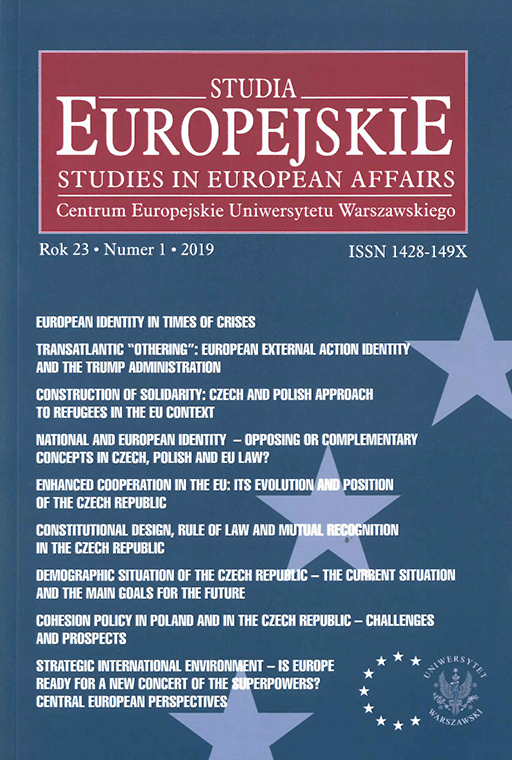
ISSUE: 1/2019
- Volume 23
- Number 1
- 2019
Subscribe NEWSLETTER
Studia Europejskie –
Studies in European Affairs
ISSN: 1428-149X
e-ISSN: 2719-3780
License
Articles published in the journal are under a Creative Commons Attribution – Non Commercial – No Derivatives 4.0 International License
European Identity in Times of Crises
Abstract
This essay tries to discuss three possible models of common European identity based on shared political values, shared economic interests and shared cultural heritage in our actual situation when Europe is suffering from many crises or their aftermaths (Eurozone crisis, migration crisis or Brexit crisis). The fi rst non-exclusive “thin” identity model is based on many essentially contested concepts (in the essay demonstrated on the concept of human dignity) and its major weakness lies in the fact that many of these values are eroding in our practices, not only in the “new” EU member states. The approach based on shared pragmatic interests does not produce strong moral commitments, but the real problem of this model is that since the beginning of 1970s one of the truly European “innovations” – its post-war model of welfare state – is put into question (The essay tries to demonstrate it using the theory of Wolfgang Streeck). The common cultural heritage model that can produce “thick” identity is on the first sight the most diffi cult to build because of the almost insurmountable plurality between European cultures. However, the shared culture can produce cosmopolitan “identity in diversity”, but only if material conditions for the creation of this “fragile” or “delicate” identity model are created in some form of reinvented welfare state that could liberate us from many fears we have.
References
Alexy R., Lidská důstojnost a princip proporcionality, „Právník”, no. 11/2015, p. 873 et seq.
Davie G., Europe: The Exceptional Case. Parameters of Faith in the Modern World, London 2002.
Delanty G., Models of European Identity: Reconciling Universalism and Particularism, „Perspectives on European Politics and Society”, no. 3/2002.
Faure S., Alonso P., Etat d’urgence: des travers dans l’Etat de droit, “Liberation”, 21st of June 2017.
Habermas J., Toward a Cosmopolitan Europe, “Journal of Democracy”, no. 4/2003, pp. 86–100.
Held D., Models of Democracy, 3rd edition, Cambridge 2006.
Krastev I., After Europe, Philadelphia 2017, https://doi.org/10.9783/9780812294262.
Kundera M., Le rideau, Paris 2005.
Kundera M., The Art of the Novel, London 1990.
Lambert R., Leder S., En Italie et en Turquie comme ailleurs, les gouvernements cedent aux marches; L’investisseur ne vote pas, “Le monde diplomatique”, July 2018.
Laskey, Jaggard and Brown v UK (1997) 24 EHRR 39.
Lemaire F., En attendant la taxe Tobin. “Le monde diplomatique”, may 2016.
Omega Spielhallen- und Automatenaufstellungs-GmbH v. Oberburgermeisterin der Bundesstadt Bonn [2004] ECR I-09609 C-36/02.
Piketty T., Zucman G., Capital is back: Wealth-income ratios in rich countries,1700–2010, “Quarterly Journal of Economics”, vol. 129/2014, pp. 1255–1310.
Šejvl M., European Identity and European Citizenship: the Case of Missing Polis?, “International Journal of Public Administration in Central and Eastern Europe”, no. 2/2008, pp. 49–56.
Šejvl M., Lidská práva jako diskursivní pojem, „Právník”, no. 6/2017, pp. 473–500.
Streeck W., The Crises of Democratic Capitalism, „New Left Review”, vol. 71, September–October 2015, pp. 5–29.
Szente Z., Gárdos-Orosz F., Judicial deference or political loyalty?: The Hungarian Constitutional Court’s role in tackling crisis situations, in: New Challenges to Constitutional Adjudication in Europe. A Comparative Perspective,
eds. Z. Szente, F. Gárdos-Orosz, London 2018, pp. 89–110, https://doi.org/10.4324/9781315164632-7.
Varghese R., Marxist World, “Foreign Affairs”, no. 4/2018.
Zucman G., The Hidden Wealth of Nations: The Scourge of Tax Havens, Chicago–London 2015
Language: English
Pages: 13-26
How to Cite:
Harvard
Šejvl, M. (2019) "European Identity in Times of Crises". Studia Europejskie – Studies in European Affairs, 1/2019, pp. 13-26. DOI: 10.33067/SE.1.2019.01